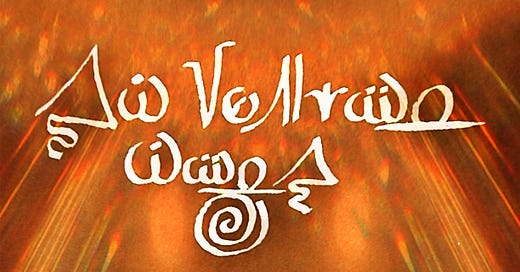Proclus the 5th century ‘Neo-Platonist’, one of the last great Platonist philosophers of antiquity is said by his biographer, Marinus, to have regarded two books only as indispensable for wisdom – namely, the Chaldean Oracles and Plato’s Timaeus.
This latter work, Plato’s dialogue concerning the creation of the universe in mythologised form is one of the most celebrated and venerated in his corpus. Whereas it may have originally been intended as a work of creative speculation to encourage thinking on the theme – the ordering of the universe by a force not directly observable or objectifiable – it became in the later Platonic tradition a scripture of almost divinely inspired status. The elements presented in the myth – the one divine architect, the paradigm of the ideas/forms, the cosmic soul, the subordinate divinities and the unformed matter which they shape into the universe of becoming- filled a hallowed position for the Platonists and others akin to a book of the Hebrew bible. In fact, Plato himself- and through Plato, his philosophical forbears like Pythagoras and Parmenides- came to be regarded as more than mere mortals.
If however we take the myth in Timaeus as just that – a creatively presented speculation on the nature of the cosmos, we can collapse the anthropocentric characters of the Demiurge (the divine craftsman) the subordinate gods, the noetic paradigm used as a model by the demiurge, the world soul, and the material base into a coherent schema where what is being described and proposed is the intelligibility of at least aspects of the world and the creativity inherent in the empirical universe. We find ourselves appearing as sentient beings in a universe which, at the very least, is co-extensive with our sentience. In other words, we experience a universe enmeshed, and inseparable from what we call ‘mind’ or ‘the mind’.
No spiritual tradition I know of actually proposes to describe literally (as in, factually or scientifically) the process of Creation. It seems to be understood that as humans, limited by the conditions of being human, the ultimate reality can only be allegorised, mythologised, or self consciously rendered into human forms through analogy. One of the great weaknesses of modernity in the religious sphere (and others I should add) has been it’s tendency towards literalism and superficiality, which is in many ways a form of idolatry. I see this increasingly in various, especially online political or lifestyle cults where spectacle and pretence or adopted literal pose replace any more authentic or organic appreciation of the subject matter. There is little less authentically traditional than self-consciously adopted traditionalism in the manner of superficial aesthetics. This would all be quite foreign to the original authors of ancient scriptures who would surely have acknowledged their own artistry and subtlety in the texts they produced, whether they believed themselves divinely inspired or not (actually, such literalism would also deny artistry and subtlety to the divine itself!)
Neither the myth in the Timaeus, nor Hebrew Genesis, nor a Vedic hymn of creation, purport to do more than point with metaphor, analogy, or allegory to the great mystery of existence which is the root of our own experience. The Buddhist concepts of dependent origination and emptiness likewise address the subject by denoting it’s inconceivably complex (or simply inconceivable) nature. “Pursue not dependent origination” so advises Shen Cao.
All of these dualistic concepts such as transcendence and immanence, creator and created, prior and after, one and many, though perfectly useable and of relative truth, are nevertheless merely our intellectual categories, the tools of our humanly conditioned understanding/knowledge.
Reality is right here, right now, and though it can never be fully grasped through the senses and our intellect, ‘it’ is nevertheless the absolute foundation of all in our experience, including our experience of ourselves.
MEDITATION
This body I perceive as my own is a part of the world I perceive, is inseparable from the world I perceive, is the world I perceive
This mind I experience as my own is an aspect of this body/mind complex, is inseparable from this body, which is inseparable from the world, is the world.
This mind is the world.
This mind-world
This, just this.




Yes, we are always working within the mystery of our own perception. It is both our means and our limitation.
Perfect! Thank you for such an intriguing perspective, Mr Ross. And for an incredibly grounding meditation. 🪷🪷🪷🙂